

American Heatwave - Classroom - BTN. Melting ice creams, fire truck sprinklers, squirrels licking ice blocks?

Clearly this is one seriously hot heatwave. PARK VISITOR, JOSHUA TREE, CALIFORNIA: It's the hottest place on earth. Like it's hot. It's never been hotter. How do bison help fight against climate change? Sea ice: Why is it so important? - CBBC Newsround. Sea ice is different to icebergs, as icebergs are created on land, while sea ice forms on the surface of the water In the Arctic Ocean there's a thing called the Arctic ice pack.
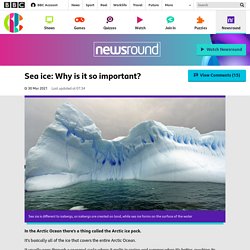
It's basically all of the ice that covers the entire Arctic Ocean. It usually goes through a seasonal cycle where it melts in spring and summer when it's hotter, reaching its lowest around mid-September, then gets bigger again during autumn and winter, when it's colder - so it changes with the temperatures. But a new study, by the Snow & Ice National Data Centre in Colorado, America, has shown that the Arctic Ocean has never had so little ice at this time of year. Climate change: Ozone layer 'healing and back on track' - CBBC Newsround. The ozone hole over Antarctica in the year 2000 The amount of harmful chemicals being released into the atmosphere is steadily declining, according to scientists, meaning that the ozone layer is starting to heal.
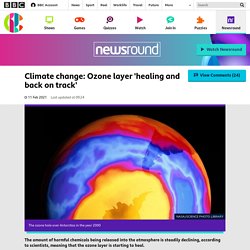
The ozone layer is a thin part of the Earth's atmosphere that absorbs most of the ultraviolet radiation from the Sun. Climate change: How global warming & rising sea levels are affecting Fiji - CBBC Newsround. To enjoy the CBBC Newsround website at its best you will need to have JavaScript turned on.

Sea levels are rising at a faster rate than ever recorded around the world. It has already had a big impact in many places, especially low-lying countries in the South Pacific. Fiji is an island nation in the Pacific Ocean and climate change is already causing huge problems for the people and environment there. Warmer global temperatures have meant higher tides - land, crops and even whole villages have been lost to the sea, as well as devastating storms and coral bleaching.
Fiji. These 5 images show how air pollution changed over Australia’s major cities before and after lockdown. Credit: Shutterstock Why This Matters: The challenge now is how to restrict pollution after COVID restrictions lift.

Have you recently come across photos of cities around the world with clear skies and more visibility? In an unexpected silver lining to this tragic crisis, urban centres, such as around Wuhan in China, northern Italy and Spain, have recorded a vastly lower concentration of air pollution since confinement measures began to fight the spread of COVID-19. Likewise, the Himalayas have been visible from northern India for the first time in 30 years. But what about Australia? Climate change: Five big issues affecting Africa - CBBC Newsround. Getty Images Like many other African countries, Madagascar has been impacted by flooding recently Climate change is a huge issue affecting lots of countries right across the world.
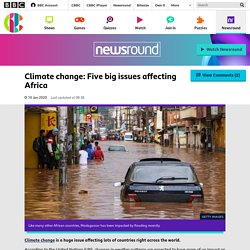
According to the United Nations (UN), changes in weather patterns are expected to have more of an impact on Africa than any other continent in the world. Flooding, drought and rising temperatures are all having an impact on people living in African countries. Many of the climate issues in Africa aren't widely known, something which young African climate activists are eager to change. Oceans can recover by 2050 if we act on climate change - CBBC Newsround. Getty Images Our oceans might be home to some of your favourite animals, from humpback whales to clown fish - but many marine species, habitats and ecosystems have been hit hard by human activity and suffered declines.
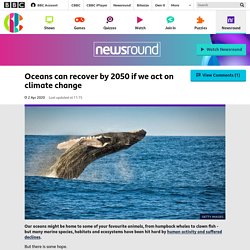
But there is some hope. Researchers writing in the journal Nature now predict that the ocean could bounce back by 2050 if major threats such as climate change, too much fishing and pollution are dealt with. Why are our oceans important? The oceans are important for many reasons: Australian scientists on IPCC 2019 climate change report. More dust storms, more farming in Tasmania and a year-round bushfire season are just some of the many predictions Australian scientists are making after the release of the latest international report on climate change.
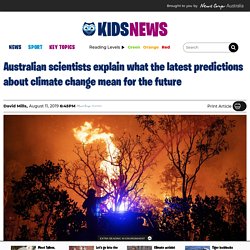
And though the report does not suggest everyone stop eating meat, it does suggest that eating more plant-based foods could be a positive move for both the planet’s health and people’s health. The Intergovernmental* Panel on Climate Change’s (IPCC) report, written by 100 scientists from around the world and commissioned by the United Nations*, was released on Thursday. Climate change report looks at food production - Newsbreak - Behind The News - BTN. Climate experts say we urgently need to look at how our food is produced.
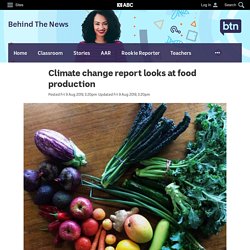
A report just released by the United Nations Intergovernmental Panel on Climate Change (IPCC) says what we eat and how it's produced plays a big part in climate change. It says cleaning up energy, transport and industry is not enough to avoid dangerous global warming and we need to look at what's on our plate. Studies tell us that beef cattle production affects global warming, through the methane gas produced by the animals and land cleared for grazing.
Shifting our farming practices presents an opportunity to cut emissions and improve health, the report states. Climate scientist Prof Ed Hawkins charted annual average temperatures to make barcode pictures. Australia — and the world — is gradually getting hotter, according to striking* pictures of average annual temperatures created by a climate scientist.
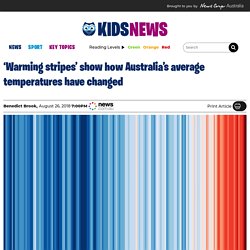
The pictures, which look like pieces of art or barcodes*, show the warmest and coldest temperatures since records began to be kept. The earliest year’s record is on the left of each picture and the latest is on the right. They were made by University of Reading (UK) climate scientist Professor Ed Hawkins, who calls the pictures “warming stripes”. Where Are Animals Most Likely to Go Extinct Due to Climate Change? – National Geographic Education Blog. Australia and South America are among the hardest hit as rising temperatures could drive the extinction of one in six species worldwide.
(Nat Geo News) Use our educator guide to learn more about teaching climate change. Discussion Ideas According to the Nat Geo News article, “animals and plants in South America and Australia [are] particularly hard hit” due to climate change.